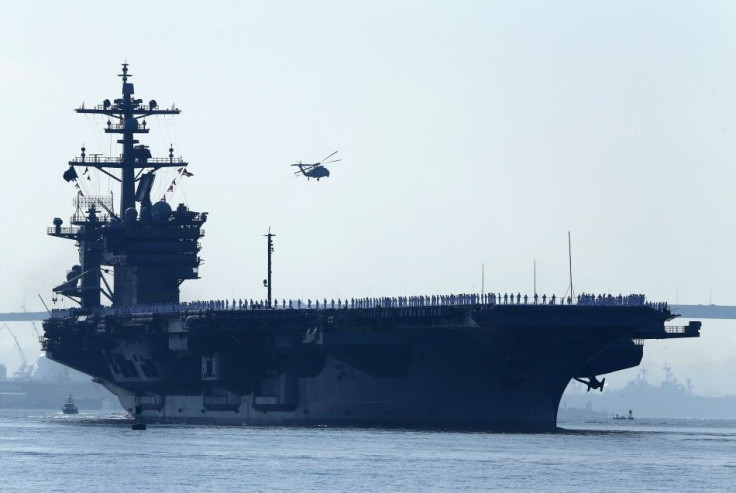US Backs Out From Sending Aircraft Carrier to Visit China

Pentagon’s idea of charming China by sending an aircraft carrier on a visit to a Chinese port has been called off. The abrupt move is being interpreted as an action to persuade China to take diplomatic route to the territorial disputes.
Steve Warren, a Pentagon spokesman said both the U.S. and Chinese officials met on Feb.5 to discuss military exchanges to build on the previous efforts. But the U.S. has decided against sending the carrier on a visit to China.
The proposal to depute the carrier on a China visit was part of the effort to expand defence ties between the two countries. The port visit by a U.S carrier to China was mooted by China’s Navy chief, Adm. Wu Shengli. In July 2014, he suggested to his American counterpart, Adm. Jonathan Greenert that he would appreciate the visit by a U.S. carrier.
Pentagon backed out from the idea after facing some domestic concerns and made it conditional, subject to the progress in U.S.-China talks on other areas and agreements, including risk reduction in mid-air collisions between military aircraft, reports Wall Street Journal.
“We are looking at China’s assertive and disruptive behaviour in the South and East China Seas, and believe that a carrier visit to China is not something we want to do,” an official said. So far, China’s defence or foreign ministry has not made any official comment.
Pentagon also met resistance from many quarters including important Republican lawmakers, who objected to the proposed visit as a possible wrong message to the U.S. allies in Asia.
McCain’s Warning
Most vocal in the opposition to the carrier’s visit was Sen. John McCain, the Arizona Republican and chair of the Senate Armed Services Committee.
“Sending such a platform to China would be seen as an international display of respect to China and its Navy, despite Beijing’s recent record of aggressive behaviour in the East and South China Seas,” McCain wrote.
Noting that the Navy’s Nimitz-class carriers was “one of the most sophisticated and lethal military tools in world history,” McCain said it would be a political and symbolic mistake for the Navy to accept a Chinese invitation for one of its massive flattop vessels to be sent on a China visit, reports Washington Post.
McCain said Pentagon’s act would send a wrong signal to allies throughout the region including Japan, Philippines, Taiwan and Vietnam, who are looking to the United States for leadership in the face of China’s coercion to pursue its territorial claims.
China’s Interest
China is showing interest in the U.S. carrier visit because its Navy is also developing a fleet of carriers. China’s first carrier, the "Liaoning" had its first sea trials in 2014 and the U.S Defense Secretary Chuck Hagel visited the ship at the port of Qingdao. The U.S. Navy enjoys the distinction of having the highest number of carriers in the world. It has 11 aircraft carriers, which is 9 more than any other country in the world.
(For feedback/comments, contact the writer at kalyanaussie@gmail.com)





















